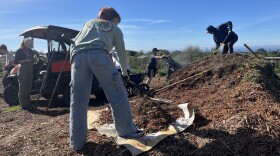Part of an ongoing series on obesity in America.
The average life expectancy for men in Holmes County, Miss., is 65 years. That's a full decade shorter than the U.S. average.
So what's killing people there? Researchers say it's no coincidence that Holmes County is also one of Mississippi's poorest, and most obese. Forty-two percent of the county's residents are considered obese.
Calvin Head, the county's former transportation director, doesn't have to see the statistics on paper. He saw the problem first hand: The school buses were overcrowded, but there were not more students.
"It was because the kids had gotten so obese," Head says. "There was no more three to a seat. You could only have, in most cases, two to a seat."
Head now leads a farmers' co-op in Mileston, Miss. It's a tiny rural community in the heart of the Mississippi Delta, the flat, fertile flood plain known as much for its entrenched poverty as for its prized cotton. He says in recent years, the overweight kids weren't only crowding the school buses but the medical clinics, too.
"They were having health issues that were normally associated with older people," Head says. "You got 10-year-olds with diabetes. We knew there was a trend developing. That was a frightening trend."
And that trend is affecting his own family. His niece, Valerie Moore, is 5 feet tall and weighs 241 pounds. She's just 28 years old but has the medicine cabinet of senior citizen.
"I have various health problems," Moore says. She's been tested for diabetes and she's been on high blood pressure medication since she was 20 years old. Even with the medication, Moore's weight and poor eating habits caught up with her two years ago. She woke up in the middle of the night and couldn't feel her left side.
"I thought I was going to die," she says. At just 26, she was having a stroke.
"And that really, really would change anybody about what you eat and how much of what you eat," Moore says.
She has shed more than 70 pounds since but still has a long way to go. Her 12-year-old daughter is already obese, but her 6-year-old son is a more healthy weight.
I go in the produce section sometimes, but I'm not even going to lie to you. Most of the time, I don't even go over there because it all depends on how much money I have.
The unemployed single mother says it's a constant struggle to put together wholesome meals for her two children.
As the nation confronts an obesity crisis, officials are trying to get families to make healthier choices. But for low-income people like Moore, it's not so much about nutrition planning as it is stretching a tight budget.
"If you have two children to feed and you don't have but $5, you are going to try to get a whole meal for the money that you have. Therefore, you might have to buy something that's not as healthy as you want it to be in order for you and your children to have something to eat," Moore says.
And that's where the Mileston Cooperative Association comes in. Farmer Griffin McLaurin has converted 15 acres of his family farm to grow organic produce, including peas, butter beans, sweet potatoes, watermelon, cantaloupe, collard greens and okra. The co-op markets it locally and provides fresh food to regional nutrition programs.
Black cotton and soybean growers banded together to form the co-op back in 1942. Now, the mostly older farmers are trying to reconnect young people to the land.
"Every generation is getting weaker and wider," McLaurin says. McLaurin, 70, says his generation had to fish, hunt and work in the garden. "But now children, that don't ring a bell with them. Hopefully we can turn it around," he says.
McLaurin is using the same organic techniques his parents used in the family vegetable garden when he was boy — techniques that he says were abandoned when Delta farmers turned to chemical pesticides and fertilizers to maximize cotton yields.
Head says given the lush, fertile land of the Mississippi Delta, children in Holmes County should be eating healthy, fresh produce every day and turning around a reputation as the most obese place in the country.
"The idea behind the farm initiative is to get people to simply understand what they're eating and where it's coming from and what impact it's having upon us," Head says.
Deep down, his niece, Moore, knows this, but she says it's hard to put into practice.
"I go in the produce section sometimes, but I'm not even going to lie to you. Most of the time, I don't even go over there because it all depends on how much money I have," Moore says.
It's still cheaper, she says, to pick up a can of processed corn than to buy four ears of fresh-picked.
If obesity has touched your life, share your story with NPR and the Public Insight Network.
Copyright 2022 NPR. To see more, visit https://www.npr.org. 9(MDAzMjM2NDYzMDEyMzc1Njk5NjAxNzY3OQ001))







